Media trade blame over Egypt football stampede
- Published
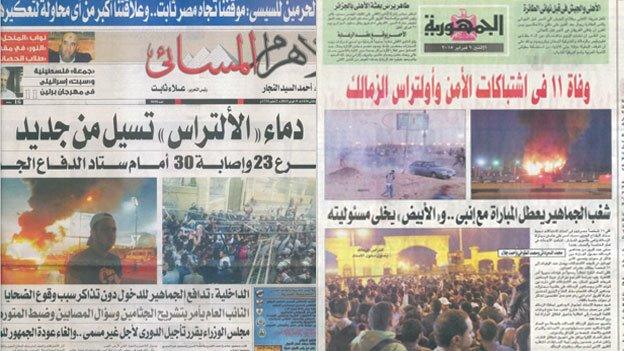
One Egyptian headline says "the blood of 'Ultras' spilled anew" - in reference to deadly football violence involving Ultras fans in Port Said in 2012
The clashes at the Cairo football stadium that left at least 22 people dead have provoked accusations and counter-accusations in the Egyptian media.
Social media users are accusing the police of masterminding a "massacre" while state media are trying to pin the blame on Zamalek Club fans instead.
Zamalek fans, known as Ultras White Knights (UWK), accuse the police of setting off the stampede by firing tear gas into a crowd of thousands of fans in a confined space.
"It is a planned massacre, premeditated murder and a conspiracy plotted by mean people," UWK said in a statement posted on its Facebook page.
This view is echoed by some Twitter users. "It is a deliberate crime prepared in advance," one user, Ahmad al-Anwar, says.
Muslim Brotherhood activist Abdul Rahman Iz tweeted that the incident was a repeat of the "massacre...by the same police and military militias" when 74 fans died in rioting at a football game in Port Said in 2012.
'Failure of the state'
Relations between the security forces and hardcore football fans have often been tense, not least because many such fans were involved in the revolution that ousted former President Hosni Mubarak in 2011.
Political figures have also weighed in, with the leader of the liberal Al-Ghad Party accusing the authorities of killing the fans and predicting that no-one would be held accountable.
"The suppression and corruption authorities [Egyptian government] will not move a muscle to bring any official to account," Ayman Nur wrote on Facebook.
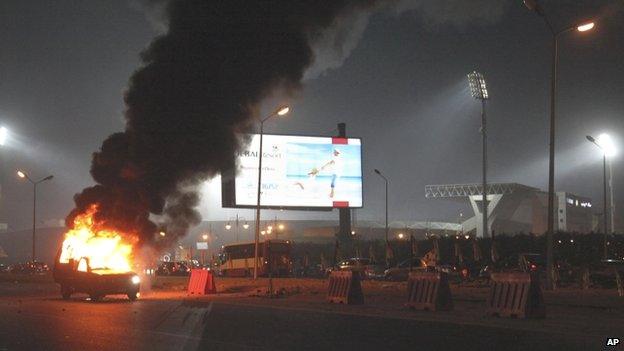
Cairo's Air Defence Stadium was playing host to the match
In the same vein, the leader of the Islamic Group's Building and Development Party, Tariq al-Zumur, tweeted that "the massacre" of Zamalek fans "is new evidence for how the gang [in reference to the authorities] allows the shedding of Egyptian blood".
In the broadcast media, ON TV Live, external presenter Ibrahim Isa blamed the state for its failure to contain the situation, criticising it for "this evident, scandalous inability to run the state".
He goes on to blame both Prime Minister Ibrahim Mahlab and President Abdul Fattah al-Sisi: "You are responsible for the blood... which was spilt today... it is your men who did wrong and it is your government and your Interior Ministry which made the mistake."
'Crowd rush'
State media have tried to blame the fans themselves for the incident. The state-owned daily, Al-Ahram al-Masa'i, external, headlined its front-page story with: "The blood of the Ultras spilled anew."
It quotes an interior ministry statement blaming "the crowd's rush" to enter without tickets and publishes photos showing them trying to force their way into the stadium through police lines.
State-owned Al-Jumhuriyah, external newspaper also blames crowds for the clashes but relegates the story to its back page. Its headline says "riots caused by crowds delay the match" and it shows photos of a burning police vehicle and crowds outside the stadium with a caption reading: "Zamalek Ultras attempt to enter the stadium."
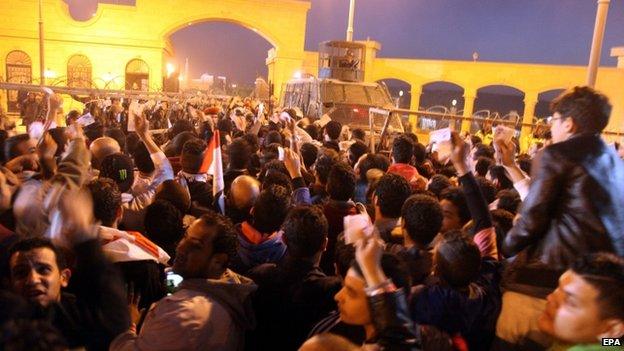
Many Zamalek fans were barred from entering the stadium
State-run Nile News TV, external led with the story, highlighting the interior ministry's statements and quoting officials who said that the cause of the deaths was either "stampede" or "suffocation".
Other journalists interviewed from Al-Misri al-Yawm, external and the Egyptian state-run news agency Mena, external said that police had no option but to deal with crowds who were trying to "storm" the stadium.
"What is reassuring is that no-one died by live bullets or birdshots as some websites or tweets on social media suggest," Mena's executive editor Isam al-Kashif said.
"Therefore, policemen and army personnel are completely innocent of this criminal act," he added.
BBC Monitoring, external reports and analyses news from TV, radio, web and print media around the world. You can follow BBC Monitoring on Twitter , externaland Facebook, external.
- Published9 February 2015
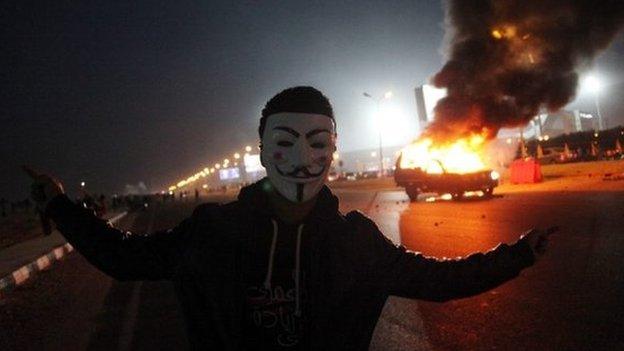
- Published9 February 2015
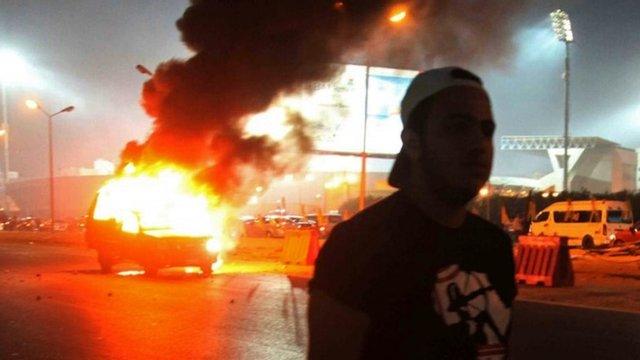
- Published7 January 2019